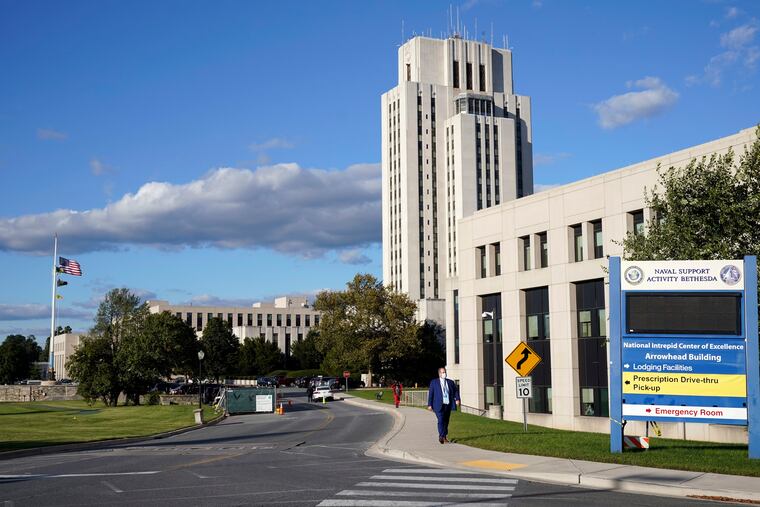Walter Reed staffers were required to sign nondisclosure agreements during Trump’s 2019 visit
The unusual request rankled some personnel at Walter Reed National Military Medical Center, according to people familiar with the episode.

WASHINGTON — Doctors and medical staffers working at Walter Reed National Military Medical Center when President Donald Trump made a medical visit there in November were required to sign nondisclosure agreements, an unusual request that rankled some personnel, according to people familiar with the episode.
Although the White House has described Trump's stop at the hospital as part of a "routine" checkup, there were signs that the visit was hastily arranged and did not follow the typical protocol for a planned presidential stop, according to the people, who, like others interviewed for this report, spoke on the condition of anonymity to describe the visit.
Trump's two-hour visit to the military hospital on Nov. 16, eight months after his annual physical, had not been listed on his public schedule.
Some members of the medical team at Walter Reed that day confided to colleagues that they had to sign nondisclosure agreements and were offended by the request, noting that they took seriously their legal and professional duties to safeguard patient confidentiality, the people said. NBC first reported the existence of the agreements.
In a statement, White House spokesman Judd Deere said "any physician caring for the President is bound by patient-physician confidentiality guaranteed under HIPAA, and I'm not going to comment on internal procedures beyond that," referring to the federal law that guarantees patient privacy.
Officials at Walter Reed did not immediately respond to a request for comment.
It is unknown whether any Walter Reed personnel were asked to sign nondisclosure agreements during Trump's stay last weekend for treatment of covid-19, the illness caused by the novel coronavirus.
Trump has sought to use nondisclosure agreements throughout his business and political career to fend off public disclosures, a practice that has drawn legal challenges.
Seeking to impose such a legal agreement on active-duty military personnel involved in the care of the president is exceedingly unusual, said several current and retired military officers.
Not only do doctors swear a professional oath to safeguard patient privacy, but all staff members who help care for the president have top-secret clearances that prohibit the sharing of any information about his condition or medical treatment. One retired senior military officer who helped supervise presidential care called the idea of requesting medical staff members to sign nondisclosure agreements "totally improper."
The revelation comes as the White House and Trump's physician are facing criticism that they have not provided full details about the president's current medical condition after he contracted the coronavirus.
White House physician Sean Conley initially avoided questions about whether Trump, 74, had received supplemental oxygen and declined to say whether scans have shown any damage to his lungs. He and other White House officials also have refused to say when Trump last tested negative for the coronavirus.
At the time of Trump's November 2019 trip to Walter Reed, then-White House press secretary Stephanie Grisham said that he had undergone a "quick exam and labs" and that he "remains healthy and energetic without complaints." Grisham also said Trump had taken advantage of a "free weekend" in Washington to "begin portions of his routine annual physical exam."
But reporters immediately began questioning why the president was taken to the military medical center in nearby Bethesda, Md., after 2 p.m. that Saturday when no such trip had been announced on his public schedule.
That Monday, Conley sought to clarify the reason for the visit. In a memo released by the White House, Conley wrote that Trump's "interim checkup" over the weekend had been "routine," and that it was not disclosed because of "scheduling uncertainties."
"Despite some speculation, the President has not had any chest pain, nor was he evaluated or treated for any urgent or acute issues," Conley wrote. "Specifically, he did not undergo any specialized cardiac or neurologic evaluations."
Trump, who has typically flown on Marine One when he has visited Walter Reed, went by motorcade on Nov. 16, traveling in an SUV kept on the White House grounds for rapid movements, according to video of his departure and two former federal officials.
He arrived at Walter Reed about 2:45 p.m. and stayed there until just after 5 p.m., a little more than two hours, according to White House pool reports.
Some Walter Reed officials were caught off-guard that the president was coming that afternoon, said two people who were briefed on the matter.
Because they had so little warning, Walter Reed staff members didn't execute the normal security protocols for a presidential visit. Roads on the hospital campus are typically closed off to prevent employees and patients from crossing the president's path. Some staff members on the campus who greet the president change into more formal uniforms in honor of his arrival. Neither of those steps were taken, the people said.
Conley said in his statement the following Monday that the president "took a brief tour" of the hospital and met with staff members, as well as the family of a soldier who was in surgery.
______
The Washington Post’s Julie Tate and Alice Crites contributed to this report.